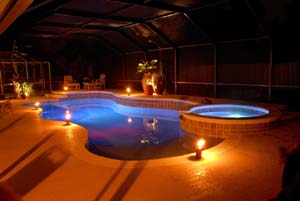Now that summer is upon you, your efforts to beat the heat have led you to decide to build a swimming pool. Good for you but now you have questions. What kind of pool should I build? Concrete or fiberglass? And what about “gunite pools?” What the heck is that? These are just some of the questions facing the prospective pool owner. Still other questions, such as what vinyl liner pools are and their benefits must be considered before making any final decisions to build that pool you are longing for.
Concrete Pools, as well as their cousins, Gunite pools, both have benefits and drawbacks as opposed to fiberglass or preformed pools. The primary advantages to concrete and gunite pools are in their flexibility. Both concrete and gunite pools can take on practically any shape the owner desires. When the hole is dug to whatever shape is agreed upon, the concrete is poured to take on that shape. Gunite pools use the same basic fabrication process but they utilize rebar to accommodate plumbing and are often accompanied by a wooden deck. Concrete and gunite pools have a long life span although the plaster used to finish gunite pools may have to be replaced every fifteen years or so and concrete pools require acid washing to remove stains. Both concrete and gunite pools tend to be expensive with gunite the more costly of the two.
Fiberglass pools have their advantages as well and one of the most evident is their reduced cost. Prefabricated pools built in large quantities are less costly but have the disadvantage of being less flexible in terms of shape, although most pool manufacturers have a variety of pools to choose from. However, reduced choices in pool shapes are offset by a variety of advantages fiberglass pools enjoy over concrete pools. Among these are that fiberglass pools don’t require acid washes or periodic resurfacing. In addition, because of the composition of fiberglass material as opposed to concrete, fewer chemicals are needed to balance the water because less alkali is leached into the pool as opposed to concrete.
The final category of pool is those of the vinyl lined variety. Vinyl lined pools are fitted to a track mounted frame and stretched to fit its contours. The vinyl itself comes in many colors and thicknesses although the standard is 20 mil. The primary advantage to vinyl lined pools are their cost. These pools generally are about one third to half the cost of other types of pools. The drawback is that the vinyl doesn’t last as long although replacement is fairly inexpensive. Another drawback is the tearing and holes that can develop from exposure to sharp edges. However, patching kits are available that can repair the damage if it isn’t too severe.
Your pool will be with you for a long time so choose wisely. Whatever pool you decide on should bring you refreshing satisfaction for decades to come!
Filed under: FAQ
Like this post? Subscribe to my RSS feed and get loads more!










